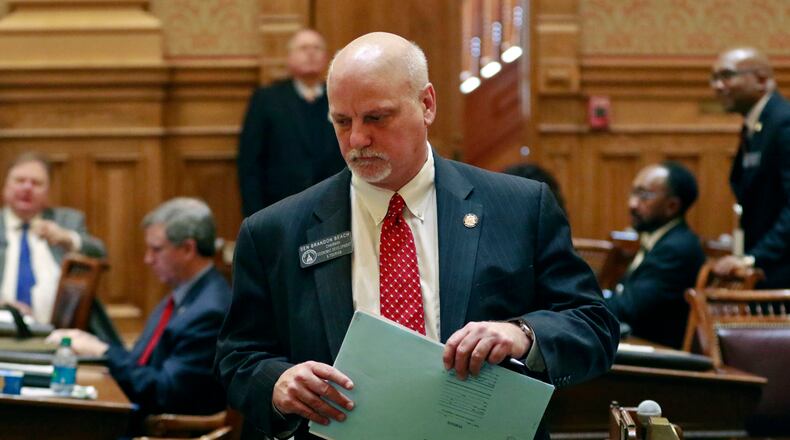Brandon Beach has established a new and important political principle in Georgia. One can be a Republican and think large thoughts, including thoughts about MARTA and rail, without being turned out of office.
The biggest names in Georgia business breathed a sigh of relief on Tuesday upon the re-election of the Alpharetta state senator. For it means that a serious discussion of transit alternatives in metro Atlanta will continue, perhaps with new confidence.
“This election was a referendum, if you will, on the willingness to come out with some big, bold, visionary ideas,” Beach said moments after he finished campaigning late Tuesday. The North Fulton Chamber executive was in a T-shirt, shorts and ball cap, sweating profusely after 12 hours of waving campaign signs along roads in neighboring Cherokee County, which held the key to his future.
Beach’s last-minute target: Cherokee voters ticked off by their time-wasting commutes home. It was worth the effort.
Beach defeated investor and philanthropist Aaron Barlow of Milton, 58 to 42 percent, in one of the most expensive races of the primary season. The pair gathered up more than $833,000, or about $53 for each of nearly 16,000 votes cast in the contest.
Barlow raised $485,692.87, every dime of it from his own Donald Trump-like pocket. Beach tapped his Senate colleagues, chambers of commerce, and businesses with high stakes in Georgia’s economic development for nearly $350,000. Outside spending has yet to be tallied, but could easily push the total price tag past $1 million. The race was considered that important.
In 2015, Beach was among many Republicans who supported HB 170, a measure to raise nearly $1 billion for road and bridge repair with reconfigured taxes on gasoline and a new tax on hotel and motel lodging.
More important, Tuesday's vote was a coda on 11 months of debate over a proposed $8 billion expansion of MARTA rail into north Fulton, to be financed — with voter approval — by a half-cent sales tax. Beach had introduced legislation to permit the northward push, but ran into fierce opposition from the mayors of some North Fulton cities.
The Johns Creek City Council approved a resolution proclaiming its "full and complete opposition" to MARTA rail in North Fulton. In the end, Beach's legislation was deep-sixed by elements within his Senate Republican caucus.
House Speaker pro tem Jan Jones, R-Johns Creek, led a rescue effort that permitted MARTA's bid for expansion — but only within the city of Atlanta proper. The question of rail beyond MARTA's North Springs station would remain a matter for future political campaigns to hash out. Beach vs. Barlow was the first.
Barlow hammered on Beach’s willingness to support tax increases in the name of better transportation, but also denounced the incumbent’s MARTA expansion proposal as antithetical to North Fulton thinking. (The Barlow campaign also implied that Beach supported MARTA expansion into adjoining Cherokee County — an impossibility forbidden by the Georgia Constitution.)
Beach said he polled North Fulton residents of Senate District 21 on the question of MARTA expansion. Sixty-four percent favored a referendum. Fifty-five percent said they would support a commuter rail push into their region. On Tuesday, Beach won 62 percent of the vote in the North Fulton portion of his district.
Beach won a majority of votes in Cherokee, too, despite that county’s tea-party reputation. Transportation is an issue there, too. Just of a different sort. Seventy-two percent of adults leave each morning for jobs outside the county lines.
“It’s a nightmare to try to go east-west — going on Highway 120 or 140 is a disaster right now, going to Roswell or Cumming,” Beach said.
But his survival on Tuesday is likely to have its biggest impact on a renewed debate over commuter rail in north Fulton, beyond the Chattahoochee River. When the Legislature passed and the governor signed the bill creating a path for MARTA to grow its rail system within Atlanta, they essentially removed Georgia’s capital city from the expansion discussion.
The next move will be up to North Fulton — and South Fulton, too. Though a larger population gives Fulton’s north side more clout. Beach’s victory on Tuesday makes that conversation more likely.
“I do think [House Speaker pro tem Jones] — and I’m not speaking for her — I think she wants to look at some options to get the mayors’ buy-in and see if we want to do something,” Beach said. A .25 percent sales tax, expanded to run 25 or 30 years, could finance a scaled-down, $2 billion transit project.
Beach says his victory is “a signal that there’s an appetite for looking at that. If we build the north line, it’s going to force Gwinnett and Cobb to come in. Because, if not, they will be 15 years behind,” he said.
***
On a somewhat related note: Early Wednesday morning, Aaron Barlow conceded defeat in the Senate District 21 race, but he promised that he's not going away. "I don't have to have the title of state senator to be a public servant, and it is my intention to serve in whatever capacity God calls me to serve," Barlow said in a statement.
Only Tuesday evening, at a gathering of the Barlow campaign in Woodstock, did top aide Andrew O’Shea fill me in on a detail that hadn’t been hidden so much as avoided. Had he won, Barlow would have been one of only two Mormons serving in the state Legislature.
A backlash from evangelicals wasn’t the campaign’s worry. That’s so 2012. But for a candidate attempting to channel his inner Donald Trump, comparisons to Mitt Romney would be unfortunate. And not just because of Romney’s current stop-Trump efforts.
In the 2012 GOP presidential primary, Romney may have won Fulton County. But he finished a distant second in Cherokee to Newt Gingrich. And Cherokee County makes up 70 percent of Senate District 21.
About the Author
The Latest
Featured




